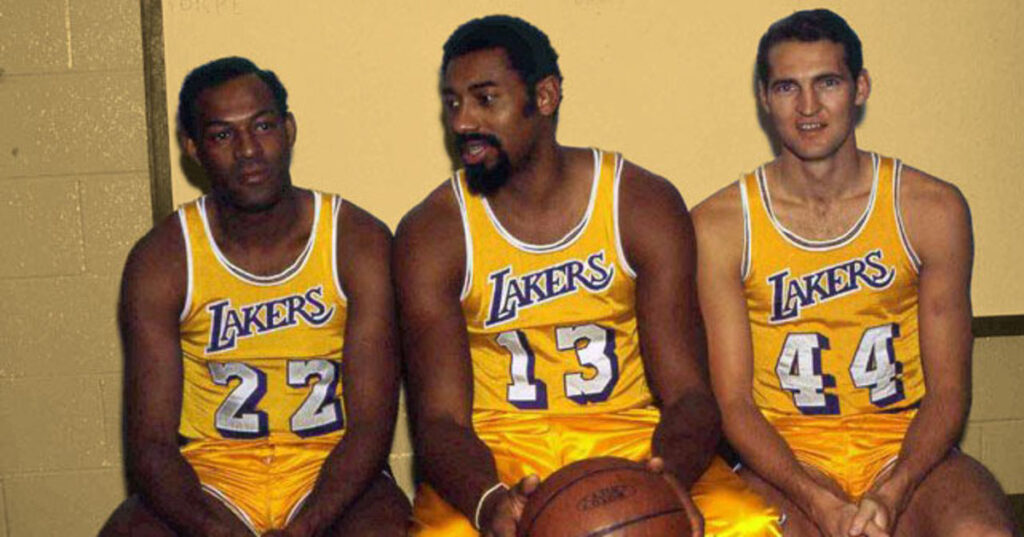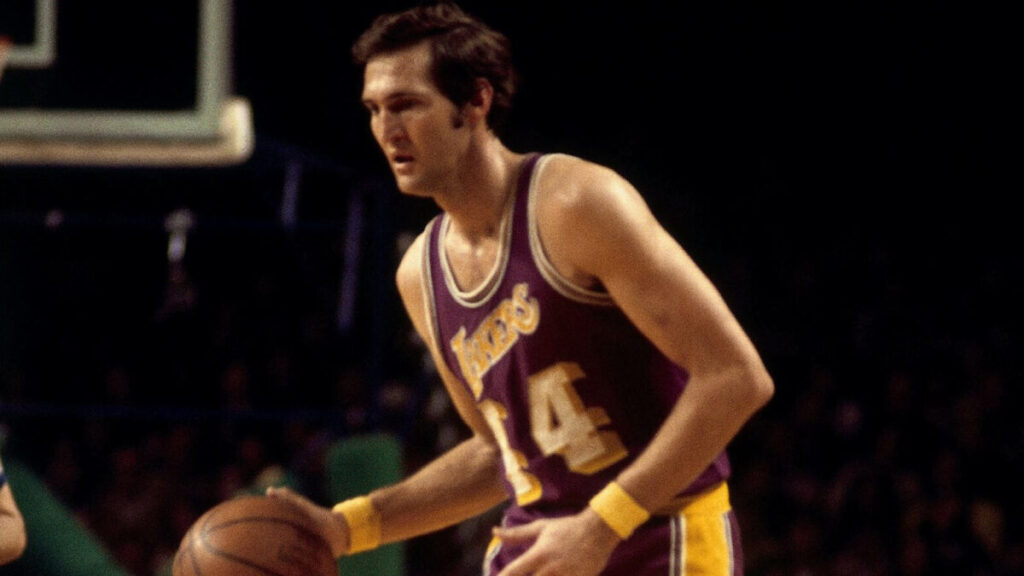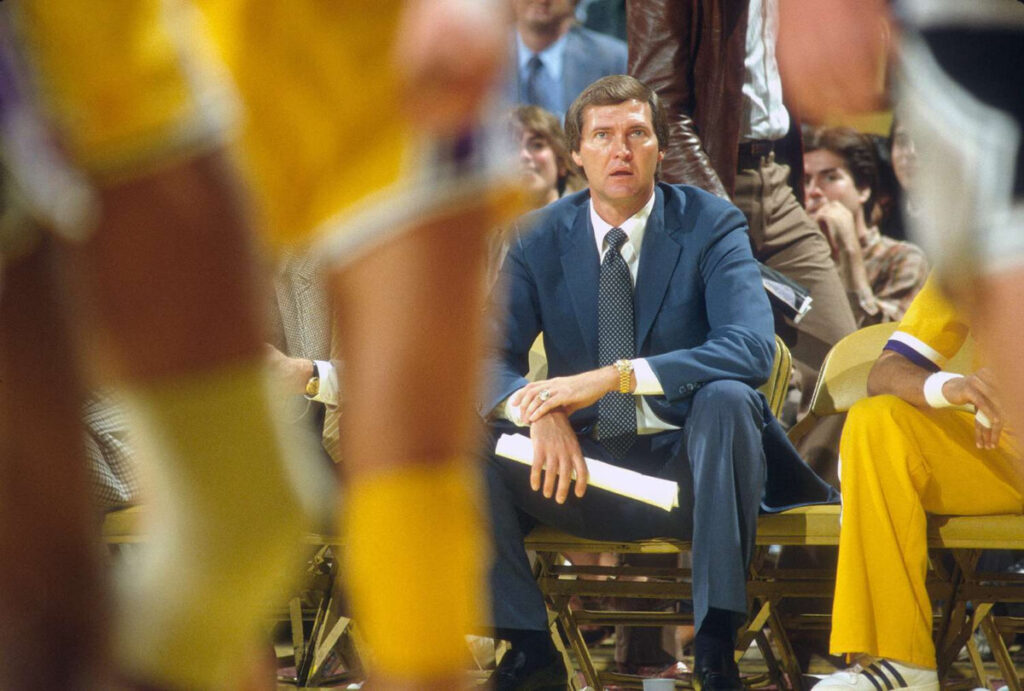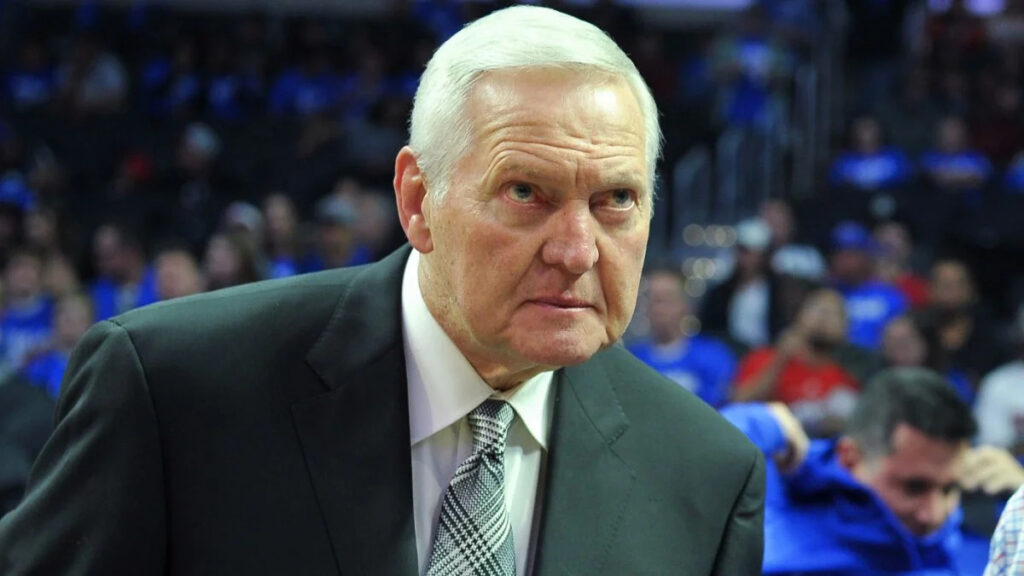
Jerry West is considered by many to be one of the greatest players in NBA history. He was a 13-time All-Star, 12-time All-NBA First Team selection, and the only player ever to receive Finals MVP honors despite being on the losing team. But even beyond his outstanding playing career, West has been an integral part of the game since he retired from playing in 1974. He has served as an executive for multiple teams, most notably with the Los Angeles Lakers where he helped build championship teams throughout the 2000s. His influence on basketball continues today through his roles as a consultant or advisor with various teams.
West’s career began in 1960 when he was drafted by the Minneapolis/Los Angeles Lakers out of West Virginia University. During his time with the Lakers, West became known as “Mr. Clutch” due to his ability to make big plays late in games and erase deficits quickly with his tireless work ethic and unmatched shooting ability. One of his most memorable moments came in Game 3 of The 1969 NBA Finals when he made a 60 foot buzzer beater that tied the game at 95 and sent it into overtime; however, they ultimately lost that series 4–3 to the Boston Celtics. Despite being on the losing end, West still earned Finals MVP honors for his valiant effort during those seven games.
West went on to play 14 seasons before retiring from basketball in 1974 but left behind a legacy unparalleled by any other player who came before him—a feat which earned him a spot among some of sport’s all-time greats including Michael Jordan and Magic Johnson. He also holds numerous records such as highest scoring average in playoffs (29 PPG), most points scored in The NBA Finals (722), most free throws attempted (1,679) and most field goals attempted (5,022). Even after hanging up his jersey, Jerry West continued to shape basketball thanks to his savvy leadership off the court while serving as an executive or advisor for multiple organizations over four decades.
Jerry West – Early Life
West was born into a humble family in Chelyan, West Virginia. The fifth of six children to Cecil Sue West and Howard Stewart West, he had an incredibly difficult upbringing as his father subjected him to physical abuse. As a result, he slept with a loaded shotgun under his bed out of fear that he might have to protect himself one day. Despite being an outgoing and aggressive child initially, the death of his older brother David who served in the Korean War left him shy and introverted. To prevent injury, he was kept away from playing sports and instead developed a passion for shooting baskets at a hoop nailed to his storage shed.
West attended East Bank High School from 1952 to 1956 where he soon became captain of the freshman team after growing 6 ft 0 in (1.83 m). He rapidly emerged as one of the finest high school players in West Virginia’s history, earning All-State from 1953 to 1956 before becoming All-American when chosen as Player of the Year in 1956. His mid-range jump shot became renowned and enabled him to score while facing tough defensive pressure. This ultimately led East Bank High School to win their state championship on March 24th that year; they honored their prodigy by changing their name each year on this date up until 1999 when it closed down.
Jerry West – College
In 1956, Jerry West graduated from East Bank High School and received interest from over 60 universities. He ultimately chose to stay in his home state of West Virginia by attending West Virginia University (WVU) in Morgantown. As a freshman with the WVU Mountaineers, he was part of an undefeated team that included Jay Jacobs and Willie Akers.

In his first varsity season under head coach Fred Schaus, West averaged 17.8 points per game while shooting 49.6% from the field and 73.2%. This impressive performance earned him numerous accolades including All-American Third Team recognition, First Team All-Southern Conference honors, Chuck Taylor–Converse Second-team All-American status, Associated Press and United Press International Third-team All-American selection, as well as Southern Conference Tournament Most Valuable Player Award. The Mountaineers ended the year 26–2 but lost in postseason tournament play against Manhattan College.
During his junior year (1958–59), West scored 26.6 points per game and grabbed 12.3 rebounds per game; he tied the NCAA five-game tournament record for most points scored at 160 (32.0 points per game). He also led all scorers and rebounders in every contest that year, including 28 points and 11 rebounds against California in the final match – enough to earn him Most Outstanding Player of that year’s Final Four along with more awards such as All-American honors, Southern Conference Tournament MVP title, Southern Conference Player of the Year award, Athlete of the Year nod, and U.S. Pan American Games basketball team gold medalist. His tenacity was put to test when he broke his nose during a game against Kentucky Wildcats yet still managed to lead WVU to victory with 19 second half points despite enduring intense pain through breathing only through his mouth.
In his final collegiate season (1959–60) West set career highs across several categories: 29.3 points per game, 134 assists on the season, 16.5 rebounds per game, 50.4% shooting average from the field and 76.6% free throw line accuracy rate were among them; this last campaign earned him more recognitions like All-American selection status and being voted Southern Conference MVP.

His best performance came against Virginia where he contributed 40 points and 16 rebounds to a single match win – altogether 30 double-doubles and fifteen 30-point games throughout that entire season solidified West’s standing among college basketball greats as he finished up with 2309 total career points alongside 1240 rebounds averaging 24.8 points per game and 13.3 boards respectively; twelve records held at WVU stand testament to this fact even today after 2011 . To cap off an already stellar collegiate career, West co-captained the U.S. men’s basketball team to a gold medal at the 1960 Summer Olympics with Oscar Robertson.
Jerry West – Los Angeles Lakers
Jerry West was drafted by the Minneapolis Lakers in 1960 and relocated with them to LA. His college coach, who also joined the team, shifted him from forward to guard. Elgin Baylor led a talented line-up that included Jim Krebs and Ray Felix at center, Rudy LaRusso and Tom Hawkins at forward and Rod Hundley, Frank Selvy and Bobby Leonard at guard.
Despite having strong guards and forwards, they were weak at center compared to the Boston Celtics’ Hall of Fame center Bill Russell. Initially, West felt out of place due to his high-pitched voice earning him the nickname “Tweety Bird” or “Zeke from Cabin Creek”. Nevertheless, he worked hard on his game and averaged 17.6 points per game for 35 minutes per night as the Lakers’ second scoring option alongside Baylor’s Mr. Inside/Mr. Outside combo. This earned him 14 All-Star Game call-ups as the team improved from 25 wins to 36 wins before eventually losing in seven games in the 1961 NBA Playoffs.
In West’s second season with the Lakers, he had to fill in for Baylor who was called up by the Army Reserves. Still, West managed to become the main scorer, averaging 30.8 points and 5.4 assists per game, even scoring a career-high 63 points against the Knicks on January 17th. This earned him the nickname ‘Mr Clutch’ due to his ability to hit important late-game shots. The Lakers went on to win 54 regular-season games, making it all the way to the 1962 NBA Finals against Boston Celtics. In an epic Game 7 ending, West tied the game at 115 before Sam Jones sealed their fate in overtime; 110–107 for Boston.

The following season saw Baylor make a full comeback as West became the team’s first ever leading scorer with 28.7 points per game. However, they were knocked out of contention early in the 1964 Playoffs with a five-game defeat from Atlanta Hawks.
The 1964–65 NBA season saw Jerry West’s career high of 31.0 points, only surpassed by Wilt Chamberlain. The Lakers made it to the 1965 NBA playoffs where their captain, Elgin Baylor, suffered a career-threatening knee injury. Despite this setback, West stepped up and averaged an NBA record 46.3 points for the entire playoff run, culminating in a hard fought battle against the Baltimore Bullets that ended with a 117–115 win.
Unfortunately for L.A., they fell short in the Finals against Boston Celtics 4–1. In the following 1965–66 season, West put up another impressive performance with 31.3 points per game along with 7 rebounds and 6 assists; he also broke an NBA record by making 840 free throws. Ultimately, they met again with Boston in the 1966 NBA Finals but lost Game 7 95–93 despite strong performances from both West and Elgin Baylor.
In the 1966-67 NBA season, West only played 66 regular-season games due to injury and saw his averages dip to 28.0 points, 5.9 rebounds, and 6.8 assists per game. The Lakers had a dismal 36 win season that ended in a first round sweep by the San Francisco Warriors in the 1967 playoffs; Butch Van Breda Kolff then took over as head coach and led them to 52 wins the following year despite West only playing 51 games due to injury with a 26.3 point average – his lowest since rookie year. In 1968 Playoffs they made it all the way to yet another NBA Finals against the Celtics but were unable to come away with a win; an injured West scored 35 points in Game 5 but lost by three points and commented of their two losses “We gave them the first game, and we gave them the fifth.”
On July 9, 1968, the Lakers made a historic trade for reigning NBA Most Valuable Player Wilt Chamberlain of the Philadelphia 76ers. The team gave up Archie Clark, Darrall Imhoff and Jerry Chambers to get their star center. Coach Van Breda Kolff was concerned about the loss at guard but had stars Elgin Baylor and Jerry West to lead his team. However, tension brewed between Chamberlain and Van Breda Kolff as “The Load” often argued with Baylor and slacked off in practice.

In the 1969 Playoffs, the 55-win Lakers defeated Atlanta Hawks and San Francisco Warriors, setting up an epic Finals series versus Boston Celtics. West put on an amazing performance scoring 53 points in Game 1 win, 41 points in Game 2 victory, 26 points in Game 6 loss and 42 points (with 13 rebounds and 12 assists) triple-double in heart breaking 108–106 defeat in Game 7 despite being hampered by serious hamstring injury he sustained late into the game. His display of courage earned him MVP award making him the only recipient from a losing side of Finals. After the game Bill Russell held his hand with John Havlicek saying: “I love you Jerry”.
In the 1969–70 NBA season, Joe Mullaney was appointed as the new coach for the Lakers. Wilt Chamberlain’s serious knee injury forced him to miss almost the entire regular season, prompting Jerry West to step up and lead L.A.. He averaged 31.2 points per game, 4.6 rebounds and 7.5 assists, earning him his first All-Defensive First Team vote plus another All-NBA First Team berth after two Second Team years.
In the playoffs, they beat Phoenix in seven games and swept Atlanta in four before facing New York Knicks in their first ever NBA Finals. In Game 3 of the series, Dave DeBusschere made a mid-range jump shot with three seconds left to give N.Y. a 102–100 lead; West responded by throwing an incredible 60-footer that tied it up but unfortunately he sprained his left hand during overtime which led them to lose 111–108.
Despite scoring 37 points and 18 assists in Game 4, more frustration followed West when Willis Reed pulled his thigh muscle yet still managed to inspire his team to win 107–100 in what was known as one of the greatest comebacks in NBA history. The Lakers eventually equalized but lost Game 7 due to Walt Frazier’s impressive 36 points and 19 assists performance despite West hitting nine of his 19 shots (with injured hands) and Dick Garrett having several crucial steals on him.
The following year saw Gail Goodrich rejoin from Phoenix Suns after playing for L.A until 1968; at 32, he averaged 26.9 points, 4.6 rebounds and 9.5 assists before Elgin Baylor ruptured his Achilles tendon ending his career while West himself suffered a knee injury that took him out for the rest of the season – ultimately leading them to lose to Milwaukee Bucks with Kareem Abdul-Jabbar (then Lew Alcindor) as MVP in five games during Western Conference Finals.
One of the most RIDICULOUS blocks by a guard I’ve ever seen. Jerry West was a different breed mane. pic.twitter.com/UzUHusR43G
— 𝗕𝗠𝗢𝗥𝗘🚨 (@bmoretalks_ball) January 25, 2023
Before the 1971–72 NBA season, West was on the brink of retirement due to his injuries and losses. However, with the hiring of future Hall-of-Fame coach Bill Sharman and Elgin Baylor’s unfortunate career ending injury, West decided to stay and help power a historic season for the Lakers. With an emphasis on tough defense and fast break offense, L.A. embarked on an unprecedented 33 game win streak, en route to a then-record 69 wins in the regular season; West himself contributed 25.8 points per game and led the league with 9.7 assists per game.
He was named All-Star, All-NBA and All-Defense First Teamer and voted 1972 All-Star Game MVP. In the postseason, they swept the Chicago Bulls before winning against the Milwaukee Bucks in six games, then facing New York Knicks in The Finals. Despite a terrible shooting slump during Games 1 and 2, West scored 4,002 playoff points which set an all-time NBA record by Game 3. After winning Game 4 due to Wilt Chamberlain’s superb outing, West scored 23 points and dished out 9 assists in Game 5 helping them lift their first ever championship title as a team.
The following year saw West take more of a playmaker role rather than scorer while he averaged 22.8 points & 8.8 assists per game – earning him another call up into his final All-Star Game despite playing only 31 games due to a strained groin. The Lakers reached 1973 NBA Finals again but this time lost in five games to Milwaukee Bucks leading to West’s retirement due to contract disagreements with Cooke who refused to renegotiate his deal after he asked for it earlier that season; at that point he had already become highest scoring player in franchise history leaving behind a legacy many still remember today.
Jerry West – Coaching Career
Jack Kent Cooke, owner of the Lakers, was renowned for his discerning eye for leadership and teaching skills. He gave Hall of Famers Sparky Anderson and Joe Gibbs their first managerial/head coaching roles – and then asked Jerry West to coach and make player personnel decisions. In 1976-77, West became head coach of the Lakers, leading them with star center Kareem Abdul-Jabbar to a 145-101 record over three years. They made it to the playoffs each season and advanced to the Western Conference Finals in 1977.
Jerry West – Executive Career
Los Angeles Lakers (1979–2000)
After a three-year stint as a scout, West became the Lakers’ General Manager in 1982. He was instrumental in creating their 1980s dynasty – also known as Showtime – that saw five championships (1980, 1982, 1985, 1987 and 1988) come to L.A., with superstars Magic Johnson, Kareem Abdul-Jabbar and James Worthy led by coach Pat Riley.
After a slump in the early ’90s, West rebuilt the team around center Vlade Divac, forward Cedric Ceballos and guard Nick Van Exel under Del Harris; they won 48 games and went to the Western Conference Semifinals. This successful turnabout earned him his first Executive of the Year Award.

West continued building upon this success by trading for Kobe Bryant (1996), signing free agent Shaquille O’Neal (also 1996) and appointing Phil Jackson as head coach (1999). He left after the 1999–2000 season but had already set up the groundwork for L.A.’s three-peat between 2000-2002 with three NBA titles.
Memphis Grizzlies (2002–2007)
In 2002, West became the GM of the Memphis Grizzlies. His reasoning: “I wanted to try something new after being a part of the Lakers’ success for so long. I wanted to make a difference.” Although his stint in Memphis wasn’t as successful as with the Lakers, he transformed a franchise on the brink of sale into a regular playoff contender by using available players (Gasol, Posey and Williams) well and bringing in coach Hubie Brown who was named Coach of the Year in 2004. That same year, West earned his second NBA Executive of the Year Award. In 2007 at 69 years old, West retired from managing duties and handed them over to Chris Wallace.
Golden State Warriors (2011–2017)
On May 19, 2011, West officially joined the Golden State Warriors as a member of their executive board. This role granted him an undisclosed minority ownership stake in the team, and he was required to report directly to new owners Joe Lacob and Peter Guber. After four decades without winning any championships, West led the Warriors to glory in 2015; this was followed by another championship victory during the 2016–17 season – making it his eighth title win whilst serving on the team’s management.

Los Angeles Clippers (2017–present)
On June 14, 2017, West announced that he was joining the Los Angeles Clippers as an executive board member and consultant. This was after helping the Golden State Warriors win their championship against the Cleveland Cavaliers. Coach Doc Rivers had mentioned the possibility of bringing West on board during the 2016 season. Although leaving the Warriors was a difficult decision for him to make, West saw it as an opportunity to take on a new challenge and said it was “one of the saddest days of his life.”
Jerry West – NBA Legacy
In 2000, Jerry West was honored by Morgantown with the dedication of “Jerry West Boulevard”. His number 44 became the first basketball jersey to be retired by WVU in 2005. A bronze statue of him was installed outside the Coliseum and another one at Staples Center in LA. The NBA even modeled their logo after his silhouette.
In 2019, President Donald Trump awarded West the Presidential Medal of Freedom for his contributions to basketball. With 14 All-Star, 12 All-NBA Team and five All-Defensive Team selections, 25,192 points scored, 6,238 assists and 5,366 rebounds in 932 games (averaging 27.0 points per game), he is only outdone by Michael Jordan, Elgin Baylor and Wilt Chamberlain in terms of playoff scoring average (33.5). During his career as coach and GM he led teams to a total of 7 championships.
Jerry West – Personal Life
Jerry West married his college sweetheart Martha Jane Kane in April 1960, but the two divorced in 1976. The couple had three sons: David, Mark and Michael. In 1978, he wed Kristine “Karen” Bua and they have two sons, Ryan and Jonnie. Jonnie played guard for West’s alma mater, the West Virginia Mountaineers, and married professional golfer Michelle Wie in 2019.
Known as an introverted yet hard-working man, West was often jeered for his high-pitched voice, Appalachian accent and shyness. Even amidst criticism from others, he never lost his determination to succeed. His first wife recalled that he’d sometimes become so frustrated after a big loss that he’d drive away without her when they returned home – something she found “heartbreaking”.

West by West: My Charmed, Tormented Life is a memoir written by him and bestselling author Jonathan Coleman which has been widely praised and became an instant bestseller. During an interview on HBO’s Real Sports with Bryant Gumbel, West revealed childhood abuse at the hands of his father led to depression.
The 2022 HBO docudrama series Winning Time: The Rise of Lakers Dynasty depicts West as temperamental with Jason Clarke playing him; however on April 19th 2022 he demanded a retraction from the network within two weeks due to what he deemed false representation.
Jerry West – Net Worth
Jerry West is an NBA star who has an estimated net worth of $50 million. He is a former player, coach, and executive for the Los Angeles Lakers and is currently a consultant for the team. He is one of the most highly decorated players in NBA history and his net worth reflects his incredible career accomplishments.
Did Jerry West ever win MVP?
Yes, he has won MVP once in his career despite being one of the best players in NBA history. He won his NBA Finals MVP title in 1969. He was named the NBA All-Star Game MVP in 1972 even though he was on the losing team.
Is Jerry West a Hall of Famer?
Yes, he was inducted into the Hall of Fame as a player in 1980. He was also inducted into the College Basketball Hall of Fame in 2006.





